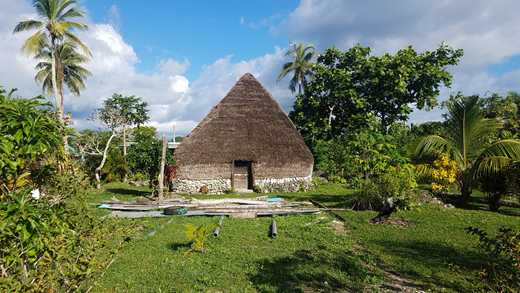position S20 47.200 E167 07.600

Ocean Rival Journey Log
Adam Power Diana Power
Mon 27 May 2019 10:19
|
Monday 27th
We rowed the dinghy slowly over
coral to the nearest beach and walked though a deserted group of
traditional round thatched Gites. The only activity from the
construction workers on the new pontoon. A sign indicated that the
pontoon would be for the benefit of tourism and it does look as if
the tourist industry needs a bit of a boost. Walked up to what we
thought was the cathedral on the cliff but is actually a nice
little chapel with seating for 4 and a slightly rusty cast iron
Virgin Mary on the roof. Lovely views of the bay and across to
the next emerald and turquoise bay (Baie du Jinek) just around the
head. Beautiful flowers and butterflys that we didn't recognise.
Following the road down to the Baie du Jinek there was a set of
steps for easy access to the water and a snorkle route marked out
with bouys. We decided to return with the dinghy so Diana could
admire the coral and fish in the dry while I snorkled.
After a coffee break we motored
round to Ginek passing over more amazing coral. The bouyed route
is set out in an stunning coral garden. More variety of Coral and
fish than I think we have seen anywhere, and in such clear water.
The bouys were keyed 1-12 on a sign on the shore offering sights
such as giant clam, fluted coral, even types of fish.
Unsurprisingly none of the sights were as marked but the tour no
less fascinating for it. A young french couple were picnicking on
the shore and chatted. They were on a pacific tour having done New
Zealand and Australia before New Caledonia. They were staying in
We, the capital of Lifou and had a hire car to explore the island.
After lunch back on board we
walked the other way and found the cathedral not far along the
road. A solid looking structure of stone and impressive carved
doors, but sadly not open.
Further on we asked directions
from a family group of Jehovas Witnesses manning a stall in front
of a large building with sign JW.org. Nearly all the houses in the
village had a hand written sign in the garden 'No Jehovas
Witnesses!' They must have been making a bit of a nuisance of
themselves.
We followed a turn down the sea
and found a substantial decaying concrete pier with a modern
warehouse. The nearby village is tiny but the capital We is on the
east coast and perhaps the commercial boats use this west facing
bay for calmer water. A young local man was working in his garden
and came over to chat. He is a history teacher at the Lycee in We.
He studied in Nice for 5 years and has visited Australia and New
Zealand. The village houses are tin clad bungalows and most have a
well maintained traditional thatched round house in the garden. I
wondered if the planning laws required owners to maintain a
traditional house if they wish to build a bungalow.

The history teacher told us
where to find the cave that was signed from our beach. We were
told to ask the men working on the cemetary wall next to the cathedral and having asked
were told to hand over 1000pcf. Unsure whether that was
an official entry fee (there were no signs) or simple robbery we
paid up and followed the path which disapeared down a great sink
hole. Steps and rope handrails had been constructed into the
bottom of the hole where the steps terminated in a water filled
cave. A great Banyan tree filled most of the hole along with
ramrod straight flying roots dropping from the top of the hole.
The entry fee seemed reasonable considering the effort that had
gone in to making it accessible.
|











